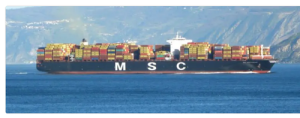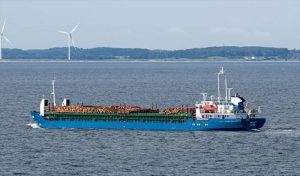Cargo owners on the Europe-Greece/Turkey route will have to pay up to $500 per reefer container after the Emissions Trading System (ETS) comes into force. This was reported by SeaNews with reference to Seatrade Maritime. “Although the details of the system itself still need to be settled, the shipping company MSC stated that compliance with the ETS requirements will lead to higher operating costs - the carrier will pass them on to customers. The associated costs will depend on the cost of EU Allowances (EUA) for CO2 emissions above the established threshold,” the publication writes.
MSC will calculate the surcharge monthly by reference to the publicly available EUA value index for export and import cargoes.
“The Emissions Trading Scheme compliance surcharge, calculated on the basis of an EUA value of €90 per tonne and assuming voyages covered by the scheme at 100%, will range from $32 per dry container on a route from the US or Canada to the EU, to $500 per reefer container from Northern or Southern Europe to Greece/Turkey. MSC has stated that the industry expects either a phased implementation of the ETS over four years from 2023, or a full implementation from January 2023. The final date has not yet been determined as the legislative process is still ongoing,” Seatrade Maritime writes.
As a reminder, in June this year, the European Parliament voted to extend the EU Emissions Trading Scheme to shipping. Shipping companies will have to buy quotas for all greenhouse gas emissions for ships over 5,000 gross tons calling at EU ports on intra-European routes, regardless of flag, and for 50% emissions on voyages starting or ending outside the EU, as well as all emissions while ships are berthed in EU ports. The system was previously expected to come into effect on 1 January 2024.
Maersk previously forecast that the additional fee for each reefer container on the Asia-Europe route would be $255.
It should be noted that in the summer of 2021, MSC was among the top ten companies that pollute the environment in Europe. At that time, according to Transport & Environment, the volume of emissions from MSC ships deployed on European routes amounted to 10.9 million tonnes. MSC was followed by Maersk (6.5 million tonnes of CO2) and CMA CGM (5 million tonnes of CO2). From 65% to 79% of emissions were accounted for by voyages between European and non-European ports.
The Russian Seafarers' Union believes that if compliance with ETS requirements leads to higher operating costs, ship owners must ensure that this does not affect crews under any circumstances. After all, it is no secret that when it comes to increasing operating costs, the first thing that often begins is optimizing the seafarers' wage fund and ship maintenance, which inevitably has a negative impact on safety.
Source: http://www.sur.ru/ru/news/lent/2022-11-11/nalog_za_vybrosy_s_sudov_zaplatjat_gruzovladelcy_21817/









